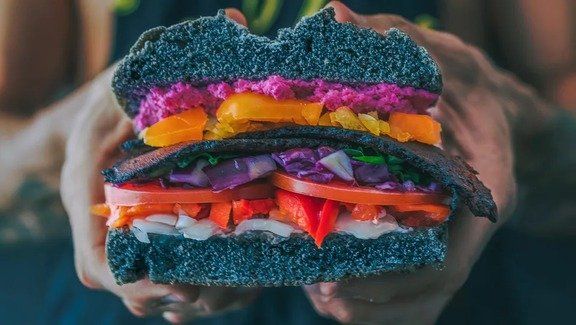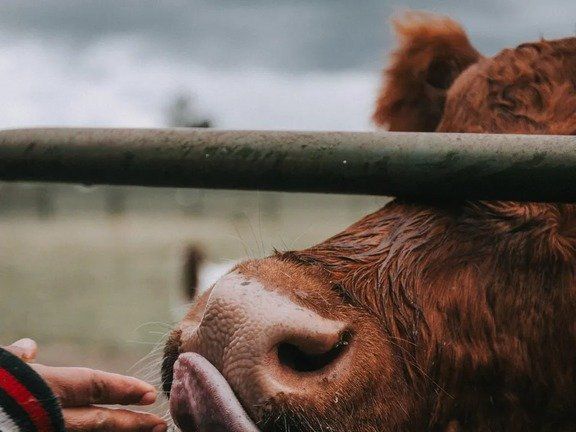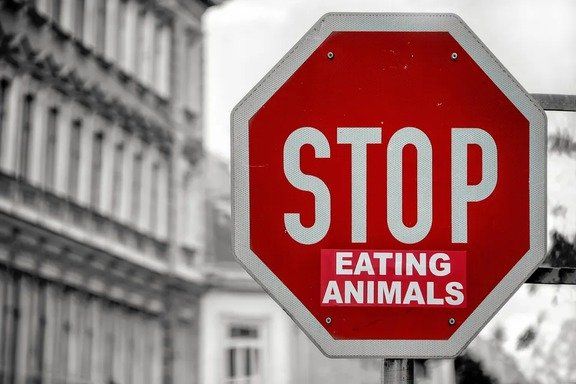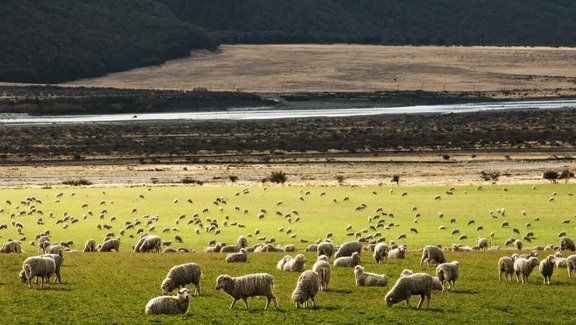Mansoor Rafiq Umar is a B.A. graduate of the Darul Na'im Institute for Arabic and Islamic Studies seminary of South Africa. He has studied under various scholars of theology and Islamic legal theory, such as Mln Taha Karaan, and Sheikh Mokhtar Magroui, and networked with organizations across the world.
1-877-HALAL-WW (+1-877-425-2599)
The "Halal Vegan Muslim"
Can a Muslim also be a Vegan/Vegetarian?
When we hear the word 'vegan' or 'vegetarian,' it might carry a positive connotation, warm vibes with a 'kumbaya' attitude: passive and peace-loving. Or, maybe it conjures up feelings and images of frolicking in nature with the wild and animal rights advocation. For the Muslim, this may appear harmless and non-contradictory. After all, it was our Prophet (ﷺ) who said, "May God curse the one who disfigures an animal." (Sunan an-Nasa'i 4442).
So how should a Muslim view veganism and vegetarianism? Today, we will explore the ideological, physical, and spiritual implications of veganism and vegetarianism from the Islamic perspective. We will touch upon the reality of these two concepts and uncover their true meanings.
What is veganism?
Veganism is the practice of abstaining from animal products, particularly in diet, and an associated philosophy that rejects the commodity status of animals. An individual who follows this diet (or philosophy) is known as a 'vegan.' Instead of meat products, dairy, and even honey, they eat various plant foods, including fruits, vegetables, whole grains, legumes, nuts, seeds, and products made from these foods.
What is vegetarianism?
Vegetarianism is the practice of abstaining from the consumption of meat and abstaining from animal by-products.
A vegetarian is a person who does not eat meat and sometimes other animal products, especially for moral, or health reasons.
Having understood the basic concept, let's first discuss the two 'isms.'
Ideologically, both concepts involve the abstinence from animal products due to the belief that the utility of animals and their derivatives is harmful, wrong, evil, unfair, or bad. It is also considered to be wrong to mistreat an animal, and to take its life.
Ideological alignment
From the Islamic perspective, many of these concepts are agreeable. It is also considered sinful and wrong to harm and mistreat an animal, and even to take the life of an animal, however, only without a valid reason, and it only becomes acceptable when certain conditions are applied. This difference will be further explored later in the article.
The terms "kind" and "humane" from the Islamic, vegan, and vegetarian perspectives all align. According to the Quran, the kind treatment of animals is a must, and it is a grave sin to mistreat any creature of God.
1. Animals must be treated kindly
The Prophet Muhammad (ﷺ) said, "There is a meritorious reward for kindness to every living creature." (Riyad as-Salihin 126)
2. Animals must be cared for
The Prophet (ﷺ) said, "A man saw a dog eating mud from (the severity of) thirst. So, that man took a shoe (and filled it) with water and kept on pouring the water for the dog until it quenched its thirst. So Allah approved of his deed and made him enter Paradise." (Sahih al-Bukhari 173)
3. Animals must not be hunted for sport or game
"The Messenger of Allah cursed those who take anything that has a soul as a target." (Sahih ) (Sunan an-Nasa'i 4441)
4. Animals must not be tortured
The Messenger of God (ﷺ) said, "A woman was punished in Hell because of a cat which she had confined until it died. She did not give it to eat or to drink when it was confined, nor did she free it so that it might eat the vermin of the earth." (Al-Bukhari and Muslim)
Islamic Humane Slaughter
Although there is a general agreement across each concept, the stark difference lies in the critical area of ending an animal's life. Vegans and vegetarians do not accept the killing of animals for consumption, yet Islam makes provision for it. Due to the lack of agreement in this area, there have been multiple debates and discussions. However, it is helpful to discuss this from a philosophical perspective to access the foundational truths present on each side. The slaughter process itself is quite detailed and extensive. It takes time to learn the process, understand the rulings, and perfect the practice. Some of the conditions for the Islamic slaughter method are that the animal must be alive, healthy, fed clean foods, gently treated, and God's name must be pronounced before its death, signifying that the taking of the life of an animal is serious. The slaughtering method should not be excessive, and it is ideal to only pass the knife over the animal 1 or 2 times. The animal should be spared from any unnecessary suffering.
The Prophet (ﷺ) said, "Verily Allah has prescribed Ihsan in all things. So if you kill, then kill well; and if you slaughter, then slaughter well. Let each one of you sharpen his blade and let him spare suffering to the animal he slaughters" (Muslim)
Philosophically, Islam is a purpose-driven religion; actions are performed with purpose. So long as the purpose is within the confines of God's word, and the act itself is according to His law, then the action is not punishable at least and is rewarded at best.
God has entrusted His earthly creation to human beings. Hence, the act of slaughter and consumption of animals is not in and of itself problematic. In fact, it is an act of worship for both the animal and the human being. The animal fulfills its purpose when milked, sheered for wool, skinned for tanning, or slaughtered and consumed. Just as an employee serves a function during their time fulfilling a role in a business setting.
"Do you not see that Allah has subjected to you whatever is in the earth as well as the ships ˹that˺ sail through the sea by His command? He keeps the sky from falling down on the earth except by His permission. Surely Allah is Ever Gracious and Most Merciful to humanity." [22:65]
"(12) And ˹He is the One˺ Who created all ˹things in˺ pairs, and made for you ships and animals to ride. (13) So that you may sit firmly on their backs, and remember your Lord's blessings once you are settled on them, saying, "Glory be to the One Who has subjected these for us, for we could have never done so (on our own)" [43:12-13]
These verses from the Quran teach us that Allah, most high, created not only animals and plants for human beings, but he entrusted their utility to us due to our status over them. According to Islamic theology, human beings are the best of His creation. Because Allah SWT honored us, he created them to be utilized by us. To hold a position opposite to this is antithetical to the Islamic worldview, and it is against the Islamic way of life. Professed Muslims should not be swayed by contemporary ideologies that contradict our creed.
"Vegan Muslim" Counterclaims
The vegan claim - that ending the life of an animal is wrong or bad - must be scrutinized upon its own merits. What makes it wrong to do so? Most activists tied to the ideology claim that it is because animals are living beings that experience pain. Therefore, it is not acceptable to cause pain to another living being, be they human or animal.
From the Islamic perspective, this argument is flawed. Not only do humans and animals experience pain, joy, and sorrows, so too do plants and other creatures that are unable to see. The Prophet (ﷺ) used to stand by a tree or a date-palm on Friday (to give the Khutbah). Then an Ansari woman or man said, "O Messenger of Allah! Shall we make a pulpit for you?" He replied, "If you wish." So they made a pulpit for him and when it was Friday, the Prophet (ﷺ) sat on the pulpit [to deliver the Khutbah (sermon)] and the trunk of the date- palm on which he used to recline cried like a child and the Prophet (ﷺ) descended (from the pulpit) and embraced it while it continued moaning like a child being quietened. The Prophet (ﷺ) said, "It was crying for (missing) what it used to hear of Dhikr near it."
Muslims believe that all creatures in the universe, both animate and inanimate, have life, procreation, language, and senses that are particular to each kind. "Sentient" is a quality of all living beings, just in different forms. If the vegan ideology is applied consistently, it will prevent a devoted vegan Muslim from chopping down, killing, and consuming even plant life.
The Practical Challenge for Muslims
Certainly, it is possible for one to disagree with the ideological position and follow the practice of non-consumption alone. Some Muslims claim to follow a vegan lifestyle, claiming that they simply do not enjoy meat, for health, or even spiritual reasons, such as abstaining from the luxuries of life.
This position should not, however, carry over into what is called a "ragban" (an aversion, or turning away from the sunnah). Any Muslim who abstains from eating meat must be sure that there is no hatred, dislike, or indifference in their heart toward the practice, nor the one who performs it, as it is Islamically established. Any Muslim who claims to follow a vegan lifestyle in consumption must disagree with the contradictory aspects. If a Muslim refuses to perform sacrifices upon the practice or "ethic" of the "veg lifestyle," then they are willingly abstaining from mandatory religious practices. This is a major problem, as not performing mandatory religious obligations is sinful and punishable.
The impossibility to complete Hajj
Hajj is a mandatory act which must be performed at least one time in every adult Muslims lifetime. Part of the ritual of Hajj is the slaughtering of an animal.
Jabir b. 'Abdullah (Allah be pleased with them), describing the Hajj of Allah's Apostle (ﷺ) said: He (the Holy Prophet) commanded us as we had entered into the state of Ihram to sacrifice the animals (as a rite of Hajj) and a group (of person; amongst us, i. e. seven) shared in the sacrifice of one (camel or cow), and it happened at that time when he commanded them to put off Ihram for Hajj (after performing 'Umra). (Sahih Muslim 1318)
Hajj cannot be completed without this step, and nullifies the performance of the ritual.
Loosing major rewards
A Muslim also faces the problem of forgoing some supererogatory acts, and by doing so, forfeit major rewards and blessings that can count in their favor of good deeds.
The Companions of the Messenger of Allah (ﷺ) asked: "'O Messenger of Allah, what are these sacrifices?' He said: 'The Sunnah of your father Ibrahim.' They said: 'What is there for us in them, O Messenger of Allah?' He said: 'For every hair, one merit.' They said: 'What about wool, O Messenger of Allah?' He said: 'For every hair of wool, one merit.'" (Sunan Ibn Majah)
Sacrificing animals on Eid al-Adha
This is an established sunnah which is performed annually by Muslims. It is highly recommended to sacrifice ones wealth and time to purchase an animal for the purpose of slaughter, sharing of meat, and consumption. Its performance shows gratitude to Allah in commemoration of the sacrifice of Prophet Ibrahim; it is considered honoring the symbols of God the Almighty. Allah (SWT) says: "…And whoever honors the symbols of Allah - indeed, it is from the piety of hearts." [22: 32] and: "Their meat will not reach Allah, nor will their blood, but what reaches Him is piety from you." [22: 37].
Children will be held indebted to Allah
The Messenger of Allah (ﷺ) said: "The boy is mortgaged by his 'Aqiqah; slaughtering should be done for him on the seventh day, he should be given a name, and his head should be shaved." (Sahih) (Jami` at-Tirmidhi 1522)
As long as the slaughter has not been performed for the son or daughter, then the child is held in "bondage" so to speak with Allah. This debt cannot be paid except via slaughter.
'Aishah (RAA) narrated, "Allah's Messenger (ﷺ) commanded them to slaughter two sheep equal (in age) for a boy and one for a girl at their birth.' (Related by At-Tirmidhi and graded it as Sahih)
Allah SWT says in the Quran, "For every community, We appointed a rite of sacrifice so that they may pronounce the Name of Allah over the sacrificial animals He has provided for them. For your God is only One God, so submit yourselves to Him ˹alone˺. And give good news ˹O Prophet˺ to the humble." [22:34]
Missing out on major rewards
The Prophet (ﷺ) concerning the udhiyah (the sacrificial animal) said, "Eat some, store some and give some in charity." Narrated by Muslim (1971).
Allah SWT says in the Quran: "That they may witness things that are of benefit to them (i.e., reward of Hajj in the Hereafter, and also some worldly gain from trade, etc.), and mention the Name of Allah on appointed days (i.e., 10th, 11th, 12th, and 13th day of Dhul-Hijjah), over the beast of cattle that He has provided for them (for sacrifice) (at the time of their slaughtering by saying: Bismillah, Wallahu-Akbar, Allahumma Minka wa Ilaik). Then eat thereof and feed therewith the poor who have a very hard time" [22:28]
Missing out on cures and other barakah
Allah SWT says in the Quran that he put a healing for people in honey. For vegans in particular, this is problematic, as honey is derived from insects.
Allah SWT says in the Quran, “And your Lord inspired the bees: “Make ˹your˺ homes in the mountains, the trees, and in what people construct, and feed from ˹the flower of˺ any fruit ˹you please˺ and follow the ways your Lord has made easy for you.” From their bellies comes forth liquid of varying colours, in which there is healing for people. Surely in this is a sign for those who reflect.” Quran 16:68-69
Thus, Islamically, the "Muslim vegan" will be left out of receiving these great benefits.
Conclusion
To conclude, it is a major problem for a Muslim to claim to be a vegan or vegetarian - both practically and ideologically. If a Muslim wants to treat animals well, then in fact, they are only following the sunnah of the Prophet Muhammad (SAWS). If a Muslim would like to abstain from eating meat, it is entirely permissible according to Islam, even though they will miss out on attaining many rewards. However, to hold fast to all of the ideological concepts of veganism and vegetarianism, (namely the slaughter practice itself), will prevent a Muslim from performing required acts of worship, which is contradictory to our religion, and unacceptable before God.
The Prophet (ﷺ) is the best example of how a human being can be, and no other way is better, alhamdulillah. We must let Allah’s (SWT) word guide our passionate causes. We must not be tricked by shaytan into thinking that slaughtering animals is backward or barbaric. Islam does not promote the ill-treatment of animals, but it also neither promotes abstinence from slaughter, veganism, nor vegetarianism. If a slaughter is implemented in the way of our Prophet (ﷺ) then it IS the definition of moral, humane, and animal rights.
Did our Prophet (ﷺ) slaughter animals? Yes. Does Islam promote unnecessary killing and harm of animals? No. Was our Prophet (ﷺ) kind and humane to animals? Yes. This is the best personality and the best way to encompass true love and respect for all beings. As Muslims, we must follow him and his way (ﷺ).
"Say, "If you ˹sincerely˺ love Allah, then follow me (the Prophet and his way); Allah will love you and forgive your sins. For Allah is All-Forgiving, Most Merciful." [3:31]
The reality is, a 'Muslim' is one who submits his will to the will of God. Morality is not something that we determine it to be on our own. Rather, what is moral is that which Allah (SWT) deems to be so. We submit to him not only in action, but in thought and concern as well. There will always be "attractive" new ideologies that pop up into the public space. Muslims must do their best to hold fast to what is in accordance with our religion, and embrace those aspects, and return those that contradict back to where they belong.
"Perhaps you dislike something which is good for you and like something which is bad for you. Allah knows, and you do not know." [2:216]
And Allah SWT knows best.
















